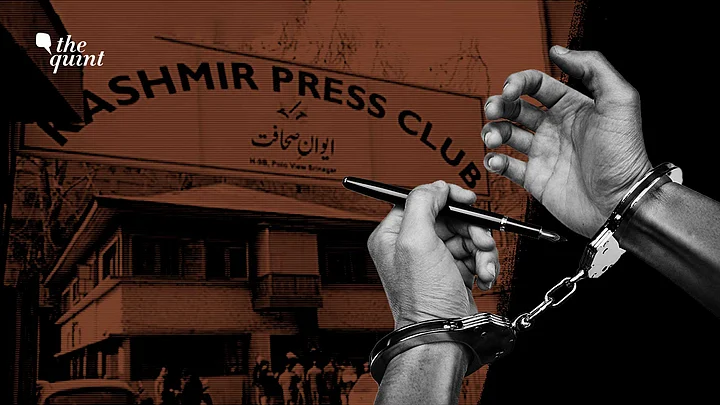After five journalists in Kashmir have reportedly resigned in the wake of a terrorist threat to them and their families' lives, there is reason to be very concerned about the situation in the valley. This puts another cloud over the prospect for holding assembly elections—on which, I hear, Prime Minister Modi is keen.
I believe the issue has been taken up for investigation by both the National Investigative Agency (NIA) at the Centre, and in the union territory. No doubt many in the government are very worried—but not nearly as much as those who have been threatened. Several of the latter have already been fending off pressure from relatives and neighbours not to back the state in order to avoid lethal risks.
They now have to contend with the fact that those panicked relatives have also been specifically threatened. Some of them must be hysterical.
Sword of Damocles Hangs Over Kashmir Press
As if to twist the impending knife, parts of the media have apparently felt the need to describe the threat as 'fake'. Imagine writing, or broadcasting that a threat against oneself which one fears to be lethally real, is fake. It’s possible they may have felt they had no option but to call it fake.
No wonder, one of those named was trying to sell his media equipment and shut shop. He apparently told a friend that he could sleep in the office but could not ask his wife or mother to do so.
Another of those under threat said, "At least they could put us in guesthouses, the way they put panchayat members when some of them were killed." But, he added that the government would need thousands of security men to guard all relatives—to whom the threat specifically refers.
Top Security For the Security-Providers
The foil to this extremely exposed situation of citizens who have stood up for the country is that the officials and other decision-makers add layers and layers to their own security—far more than those who combatted the riskier situation of the 1990s. It’s almost as if they were preparing for war.
When I tried to visit an officer in Srinagar on the morning after separatist leader Ali Shah Geelani died last year, a rifle-totting security man did not allow me to move past the gate—not even one metre to the shade of a tree.
I had to stand next to the gate for half an hour while sahib decided whether he would see me. Of course, I couldn’t phone to ask, since sahib and his fellow sahibs had decided during the night to shut down the phone and internet access of ordinary citizens.
By contrast, young journalists familiar with them could walk straight into the homes (families did not stay with them then) of some senior security officers in the mid-90s when terrorist violence was at a peak.
Now, they are building a gate that could rival a Mughal city gate at the entrance to an enclave where many such sahibs reside in Srinagar.
The Irony of Targeted Threats
Nobody will tell you this, of course, for many in the local media do not dare to report such things. That is the great irony of these threats: some of the journalists who have been named in a threat message have also been targeted by the government forces. One of them is in jail.
Another of those named was apparently summoned from Srinagar to Anantnag after a relatively innocuous report some months ago. He was sent back, then informed that a case had been registered against him, and so was kept on tenterhooks.
The boldest nationalist youth who has taken on terrorism fearlessly, was celebrated by one force of the Indian establishment but humiliated by another—which slapped a case on him too. It’s really quite bizarre.
Is Centre Ready To Account for the Kasmir Situation?
I stressed when the constitutional changes were made in 2019 that, for the first time, the Centre was taking direct responsibility for the situation in Kashmir—which Congress governments had consciously avoided for decades. They always wanted a state government as what they called a `buffer’.
I further argued at that time that owning responsibility was a good thing, for it would fix accountability. I should have said 'ought to fix’ instead of `would fix’ for the wheels within wheels, of which I wrote in The Generation of Rage in Kashmir did not cease to turn.
In fact, some of those who have a glimpse of goings-on within the power corridors are convinced that there are two strong centres of policymaking, which sometimes work divergently.
Crackdown on Journalists, Activists Persists
The administration of the union territory was in any case, hobbled for a couple of years after the constitutional changes, partly because the chief secretary did not allow the first Lieutenant-governor to function. It is only since this summer that people, by and large, had begun to feel secure and at ease with the situation.
As if on cue, a new round of threats has cropped up, issued by a shadowy outfit calling itself 'The Resistance Front' or TRF and an older website. They have now focused specifically on journalists and social and political activists who have been willing to work with those in power.
Lawyers and judges too have been named in the threat message. This is a change from the past, when most lawyers fell in line with the separatist narrative, and in their approach to their work.
(The writer is the author of ‘The Story of Kashmir’ and ‘The Generation of Rage in Kashmir’. He can be reached at @david_devadas. This is an opinion piece and the views expressed above are the author’s own. The Quint neither endorses nor is responsible for the same.)
